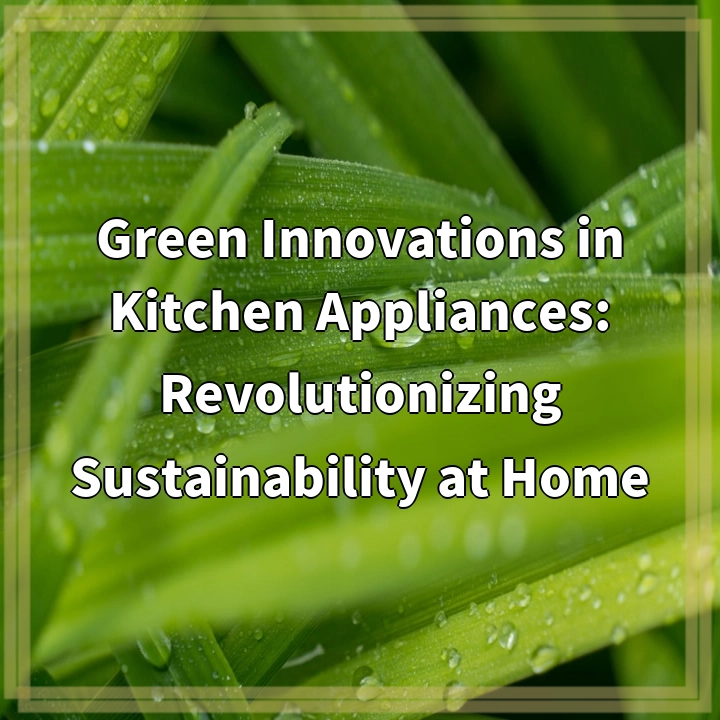
What it is:
Green innovations in kitchen appliances refer to the development and implementation of environmentally friendly technologies and practices designed to reduce energy consumption, minimize waste, and lower the overall carbon footprint of household cooking and food preparation. These innovations include energy-efficient appliances, such as refrigerators, ovens, and dishwashers that utilize less electricity, as well as smart devices that monitor energy usage and optimize performance. Additionally, many new appliances are made from sustainable materials and have a longer lifespan, promoting reduced waste and encouraging sustainable consumer behavior.
Real-world Problems:
Despite the advances in green technology, several real-world problems remain prevalent in the kitchen appliance sector. One of the major issues is the high initial cost of energy-efficient appliances. Although these products can lead to significant savings in energy bills over time, many consumers are deterred by the upfront investment, especially in financially constrained households. This can limit the adoption of innovative appliances that would help reduce overall energy consumption.
Environmental Impact of Production:
The production of kitchen appliances, even those marketed as ‘green’, often involves resource-intensive processes and can result in environmental damage if not managed responsibly. Many manufacturers still rely on unsustainable materials or practices, leading to pollution and waste during the manufacturing phase. Additionally, the improper disposal of old appliances poses a significant environmental concern, as they may contain harmful substances that can leach into the ecosystem.
Lack of Consumer Awareness:
Another issue is the lack of consumer awareness regarding the benefits of green kitchen appliances. Many consumers remain uninformed about the potential long-term savings and environmental benefits that these innovations can provide. This knowledge gap can hinder the transition towards more sustainable kitchen practices and the adoption of energy-efficient technologies.
Interoperability and Compatibility Issues:
As smart technology becomes more integrated into kitchen appliances, interoperability remains a challenge. Many consumers face difficulties in ensuring that their new green appliances can seamlessly work with existing smart home systems. Without compatibility, users may miss out on potential energy savings and enhanced convenience that come with utilizing smart features, ultimately limiting the positive environmental impacts of these innovations.
Regulatory Barriers:
Regulatory policies governing energy efficiency standards can also present challenges. In some regions, outdated regulations may not adequately incentivize manufacturers to produce cutting-edge green technologies. This can slow innovation within the industry and limit the availability of sustainable options for consumers.

Solutions to Promote Green Innovations in Kitchen Appliances
Addressing the challenges associated with green innovations in kitchen appliances requires a multi-faceted approach that involves consumers, manufacturers, and policymakers. By implementing these solutions, we can drive the adoption of sustainable practices and technologies in our kitchens.
Incentivizing Energy-Efficient Products
To encourage consumers to invest in energy-efficient appliances, governments and organizations can provide financial incentives such as rebates, tax credits, or low-interest financing programs. These incentives can significantly lower the initial costs of green appliances, making them accessible to a broader audience and fostering a culture of sustainability in households.
Raising Consumer Awareness
Educational campaigns focused on the benefits of green kitchen appliances can empower consumers to make informed choices. Manufacturers, retailers, and environmental organizations can collaborate to create informative materials demonstrating the long-term savings and environmental advantages of using sustainable products. Workshops or online resources can also help guide consumers in selecting the most efficient appliances for their needs.
Improving Product Design and Compatibility
Manufacturers should prioritize designing kitchen appliances that are not only energy-efficient but also compatible with existing smart home systems. Enhancing interoperability in new appliances can lead to better user experiences and encourage more homeowners to leverage smart technologies for optimized energy use.
Sustainability in Production Practices
To minimize the environmental impact of producing kitchen appliances, manufacturers can adopt sustainable practices, such as using responsibly sourced materials, implementing waste reduction strategies, and employing energy-efficient production processes. By focusing on sustainability throughout the entire lifecycle of the product, companies can contribute positively to environmental conservation.
Advocating for Stronger Regulatory Frameworks
Collaboration between industry stakeholders and policymakers is essential to establishing updated regulatory frameworks that support innovation in energy-efficient appliances. By advocating for stricter energy efficiency standards and environmental regulations, we can incentivize manufacturers to invest in greener technologies and practices, ultimately benefiting consumers and the planet.















